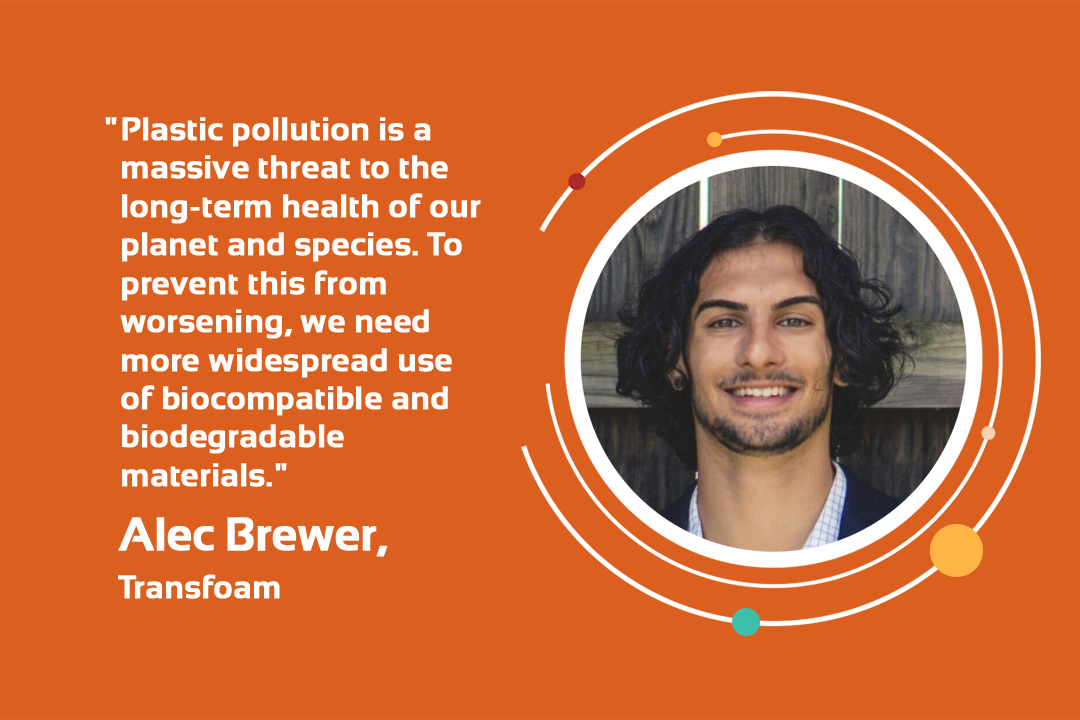
An innovator’s journey from idea to market can be challenging and complicated—but also rewarding. Each month we explore how inventor-entrepreneurs in our network have evolved since they started their journey. Our goal is to share key learnings and best practices with early-stage science and technology inventors embarking on a path of innovation and entrepreneurship. Our latest spotlight is with Alec Brewer, co-founder and CEO of E-Team Transfoam. Only 9% of all the plastic that’s ever been produced has been recycled — and a whopping 79% of plastic pollution has ended up in landfills, the ocean or other natural environments. Biodegradable plastics can serve as an alternative to petroleum-based plastics but manufacturers are currently unable to scale their operations quickly enough to meet demand. Transfoam has developed a biomanufacturing process that uses engineered microorganisms to convert petroplastic into a plastic alternative called PHB that can fully degrade in faster than existing alternatives. Transfoam is solving two problems at once: removing plastic pollution from the environment while also producing a sustainable closed-loop alternative.
What challenge did you seek to solve with your innovation and why?
Plastic pollution is a massive threat to the long-term health of our planet and species. It’s estimated that humans consume upwards of 25,000 microplastics per day, and while much of it comes directly from its use, the problem is perpetuated by the difficulty and lack of incentive to collect, sort and recycle petroleum-based polymers. To prevent this from worsening, we need more widespread use of biocompatible and biodegradable materials.
What have you learned along your innovation and entrepreneurship journey?
The longer you keep at it, the more you’re going to learn and the farther you’re going to go. It can get overwhelming, but having a strong team and community, an appetite to learn, and an idea of where you want to end up will help you through even the most uncertain times.
Tell us how you’ve integrated environmentally-responsible practices into your innovation or process.
Polyhydroxybutyrate’s (PHB) marine and backyard biodegradability render it one of the most sustainable plastic alternatives on the market. By using a waste-based raw material, our PHB will use significantly less water and will also have a reduced environmental toxicity footprint.
How has support from VentureWell impacted your innovation and venture?
VentureWell has been a huge asset on our journey since well before we were accepted to Stage 1 of the E-Team program. We weren’t accepted the first time we applied but the VentureWell team helped us make improvements to our business plan that enabled us to succeed the second time we applied. The feedback and connections we’ve gained through workshops and networking opportunities VentureWell offers have led us to a number of opportunities we would likely have missed otherwise.
What’s next for you?
With 2/3 of our founders finally graduated and dedicated full-time to Transfoam, we have begun to outfit our very own lab and office and search for our first full-time employee in preparation for our next stage of growth. We’re figuring out the best path forward with the data we have collected and the potential collaborations we have lined up in the last several months of SBIR Phase I research and Phase II prep.
The E-Team Grant program supports dedicated science- and engineering-based student teams from across the nation in bringing their high-impact innovation out of the lab and into the market.
What does it take to get from idea to impact? Our new case study offers a deep dive into one innovator’s entrepreneurship journey, highlighting the nuanced experience, lessons learned, and major development milestones.
The Aspire program prepares climatetech and medtech startups for investment. Learn more.